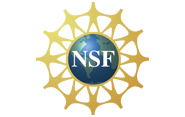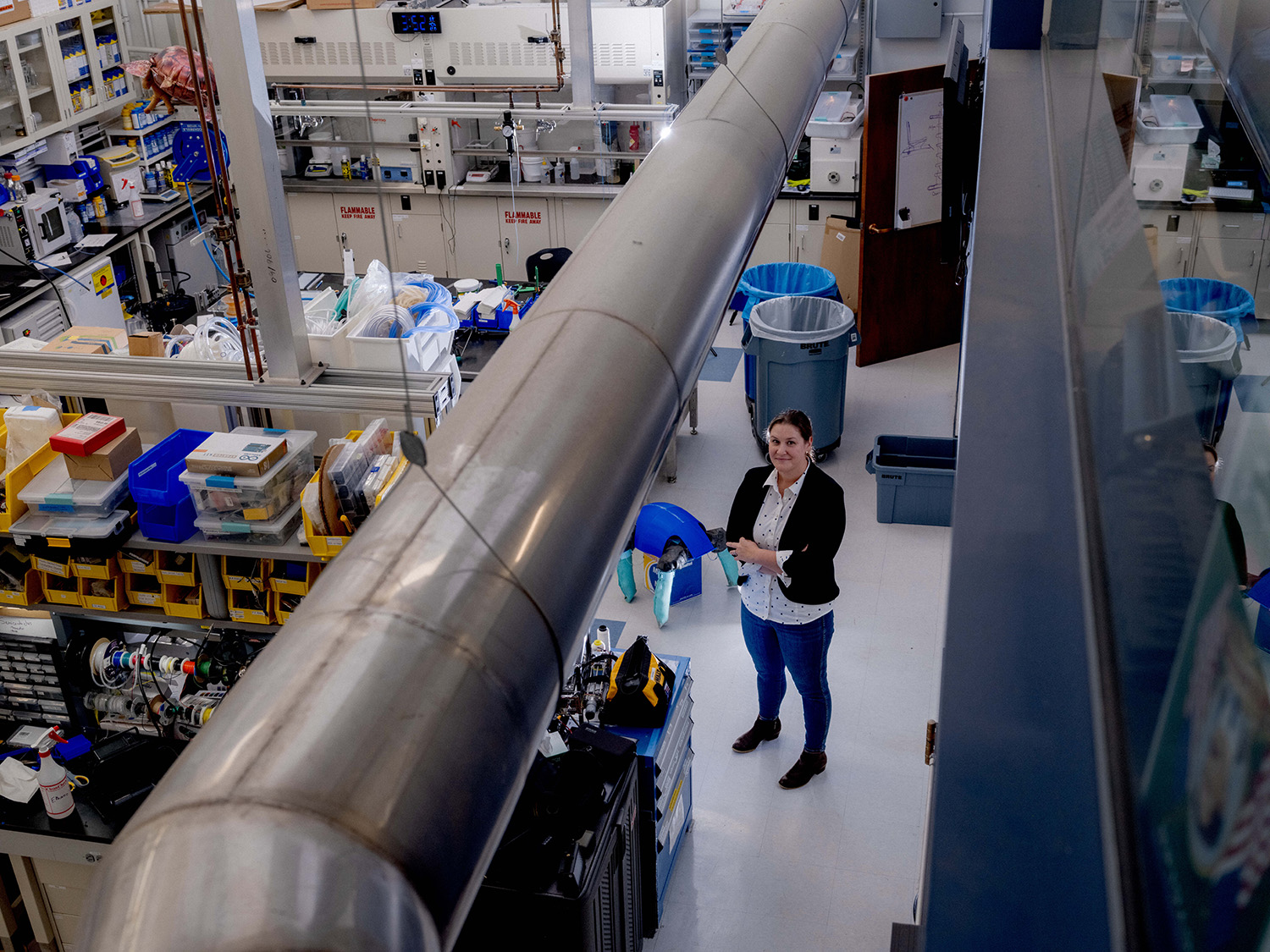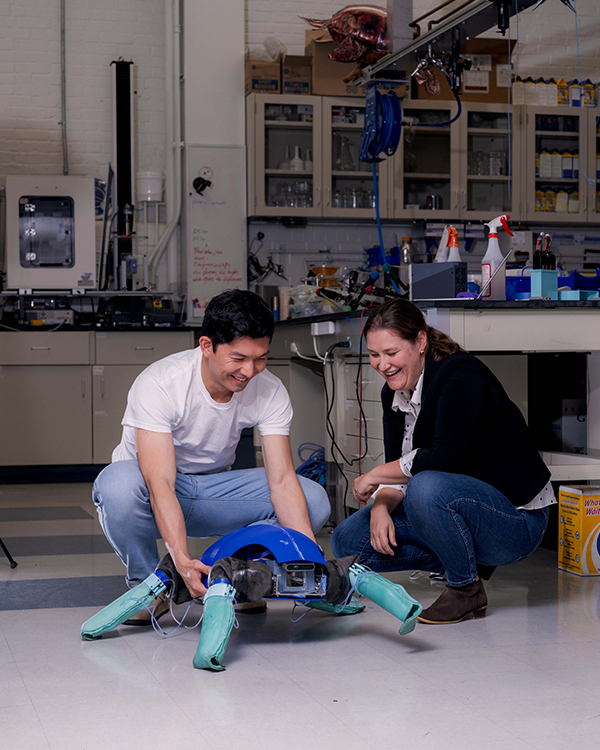Rebecca Kramer-Bottiglio wins NSF Alan T. Waterman Award

The U.S. National Science Foundation has honored Rebecca Kramer-Bottiglio with the Alan T. Waterman Award, the nation's highest honor for early-career scientists and engineers.
Kramer-Bottiglio, the John J. Lee Associate Professor of Mechanical Engineering & Materials Science, is the first Yale researcher to receive the prestigious award. She joins two other recipients, Muyinatu A. Lediju Bell, a biomedical engineer at Johns Hopkins University, and Katrina G. Claw, a genetic scientist at the University of Colorado Anschultz Medical Campus. All are recognized for their innovative approaches and leadership in their respective fields and for pushing the boundaries of science in truly novel ways.
"These three outstanding researchers exhibit extraordinary scientific research accomplishments and stand out as leaders among their peers," said NSF Director Sethuraman Panchanathan. "This award recognizes their contributions and is also a vital investment in the future of science discovery and innovation, empowering the awardees to deepen their research, expand their projects, and explore new frontiers in their field. More importantly, it enables these exceptional individuals to apply their groundbreaking work for the betterment of their communities and society at large."
Creating robots that adapt and evolve to changing conditions
 Rebecca Kramer-Bottiglio has “always been drawn to math and prototyping, and the thrill of uncovering how things work” she said. “Engineering seamlessly integrates these passions.”
Rebecca Kramer-Bottiglio has “always been drawn to math and prototyping, and the thrill of uncovering how things work” she said. “Engineering seamlessly integrates these passions.”
Her multidisciplinary research approach incorporates materials science, robotics, artificial intelligence, biology and art. Her breakthrough design strategy of adaptive morphogenesis for robotics is inspired by biological adaptations, morphogenesis, and evolution, and extends techniques she developed to create shape-shifting and phase-changing materials. When integrated into robots, these new materials enable transformative new capabilities via unprecedented adaptive behaviors.
“Robots are traditionally mechanical assemblies designed to complete a single task in a specific context. In contrast, biological organisms adapt physiologically, behaviorally, and morphologically in response to changing environmental conditions,” Kramer-Bottiglio said. “My research focuses on imbuing next-generation robots with the ability to adapt and evolve like animals. I study multifunctional materials and their utility in soft-material robots capable of evolving their physical structure and corresponding behavior as they encounter new task demands or environments.”
Kramer-Bottiglio developed an amphibious turtle-inspired robot with limbs made from coupled fluidic actuators and variable-stiffness materials that change between hydrodynamic flippers and load-bearing leg shapes depending on the environment. Adapting both the form and function of the robot enabled efficient movement both in water and on land, yielding energetic savings for multi-environment locomotion. With this morphing robot platform, she proved that morphological adaptation is a favorable strategy to expand the future capabilities of robots while simultaneously reducing the energy requirements to do so.
“Breaking through my own conception of what robots can be helped me realize their potential,” she said. “If we discard the notion that robots must be mechanical assemblies of discrete components and instead consider them as material systems with multifunctionalities, we gain access to a host of new materials, techniques and tools that can be used to create the next generation of robots.”
 Kramer-Bottiglio is a mentor dedicated to broadening participation in STEM research. She is the recipient of awards from the NSF CAREER program (ENG CMMI), Designing Materials to Revolutionize and Engineer our Future program (ENG CMMI), Emerging Frontiers in Research and Innovation (ENG EFMA), Human Centered Computing program (CISE IIS), and Innovative Technology Experiences for Students and Teachers program (EDU DRL).
Kramer-Bottiglio is a mentor dedicated to broadening participation in STEM research. She is the recipient of awards from the NSF CAREER program (ENG CMMI), Designing Materials to Revolutionize and Engineer our Future program (ENG CMMI), Emerging Frontiers in Research and Innovation (ENG EFMA), Human Centered Computing program (CISE IIS), and Innovative Technology Experiences for Students and Teachers program (EDU DRL).
“The NSF has been incredibly important throughout my career, supporting my research in areas such as materials processing, soft robotics and engineering education,” she said. “For instance, one NSF award supported a collaborative research project to test the hypothesis that the implementation of soft robot design experiences improves students’ engineering self-efficacy and interest in engineering careers as compared to traditional robot design experiences. Through a partnership with experts in engineering education, we found evidence to support this claim. The research resulted in a new engineering design curriculum that has been sustainably integrated into an upper high school course with national dissemination. I am unsure that I would have been able to pursue such an interdisciplinary project without the support of the NSF.”
The Waterman Award will enable Kramer-Bottiglio to pursue interdisciplinary and high-risk research directions that hold the potential to unlock new capabilities for robots, enabling them to evolve on demand in response to changing tasks or environments, she said. “Robots that can evolve on demand provide a platform to study physical evolution-based optimization. How and when should a robot adapt its shape when switching between tasks or environments? What are the optimal shapes for specific tasks and environments? Can we use synthetic evolution to discover adaptation strategies that natural life might use to adapt to our changing environment? Can the use of living materials in robots increase their adaptive capabilities? I hope to find out.”
In addition to a medal, awardees each receive $1 million over five years for research in their chosen field of science. The Waterman Award will be presented to the recipients at a ceremony during the National Science Board meeting, which will be held in Washington, D.C., on May 1.
“This substantial funding is a vital investment in the future of science discovery and innovation, empowering the awardees to deepen their research, expand their projects, and explore new frontiers in their field,” Panchanathan said. “More importantly, it enables these exceptional individuals to apply their groundbreaking work for the betterment of their communities and society at large. This award is a seed for future growth and impact, offering the awardees the resources they need to turn their vision into tangible solutions for some of the most pressing challenges of our time.”
The award, established by Congress in 1975, is named for Alan T. Waterman, NSF's first director.

